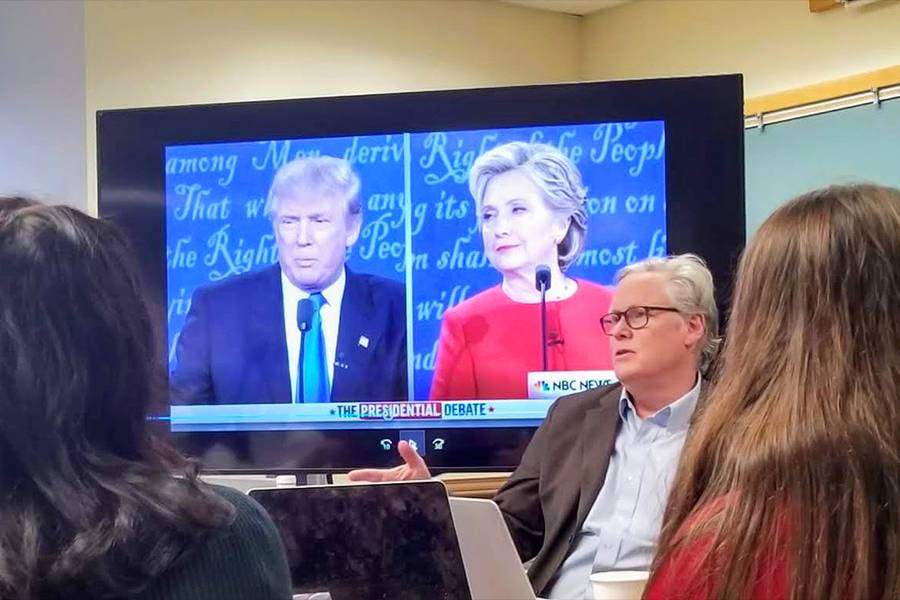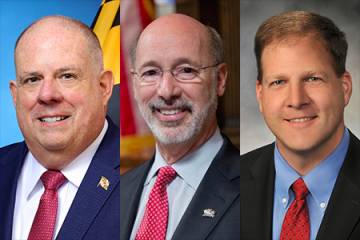America's presidential debate format is broken.
That's the position advanced by Intelligence Squared U.S., which argues that the current debate format is little more than reality TV—a string of "gotcha" moments, canned soundbites, and personal attacks.
It advocates for the more substantive Oxford-style debate, a format that puts a premium on persuasion. In an Oxford-style debate, one side proposes and the other opposes a sharply framed motion through opening arguments, back-and-forth discussion, and closing statements. Audience members vote for their preferred position at the start of the debate, then again at the end to determine a winner.
In the run-up to the 2016 presidential election, the nonpartisan nonprofit—which has hosted more than 160 live debates—called for a shift to an Oxford-style format for presidential candidates. The result? "We failed," Intelligence Squared moderator John Donvan recalled this week.
Still, the proposal generated some social media buzz about the need for reform, he said, and the organization's Change.org petition amassed more than 64,000 signatures.
On Tuesday, Donvan, who is also a correspondent for ABC News and PBS NewsHour, visited a weeklong Johns Hopkins University Intersession course called In Search of Intelligent Debate. The instructor is Donvan's former Intelligence Squared colleague, Dana Wolfe, an Emmy Award-winning journalist who served as executive director of the debate series for more than a decade. Wolfe is a visiting scholar at the Stavros Niarchos Foundation Agora Institute at Johns Hopkins.
This week, 17 students are learning about the principles of Oxford-style debate and hearing from guest speakers. On Friday, they'll engage in their own debates, with Donvan serving as moderator. The event, which is open to the public, will take place at 4 p.m. at FastForward U Homewood, located at 320 W. 29th St.
Expected debate topics, selected by the students, are:
- Home DNA tests do more harm than good
- The U.S. president is acting on behalf of Russia
- Ex-felons should receive voting rights
- Apple should engineer a backdoor for their devices
- Abolish the SAT
Wolfe, who previously produced Nightline for ABC News, helped found Intelligence Squared U.S. in 2006 with the mission to "restore critical thinking, facts, reason, and civility to American public discourse."
Video credit: Intelligence Squared
Since then, the series—an offshoot of the London-based original&mdashh;has recruited more than 500 policymakers, academics, journalists, CEOs, and other thought leaders to take part in its debates. The roster of participants includes Ariana Huffington, Karl Rove, Deepak Chopra, Julian Castro, Jack Abramoff, Malcolm Gladwell, and Laura Ingraham.
Debate topics have included climate change, Islamic radicalism, big box retailers, and college football. Some recent motions have included "Silicon Valley has lost its soul," "Social media is good for democracy," and "Swipe Left: Dating apps have killed romance."
At Johns Hopkins, the Intersession course also delves into various other forms of debate "both in the U.S. and on the other side of the pond in the U.K.," Wolfe said.
One student said she took the class to build on her experiences with Model UN in high school, where the format often had limitations: "Everyone just talks and talks, and no one really responds to what the other person is saying."
In addition to Donvan, other guest speakers this week have included PBS NewsHour producer Sara Just, Wall Street Journal editor-at-large Gerard Baker, and two past Intelligence Squared debaters who faced off on the topic "Men Are Finished": author and philosopher Christina Hoff Sommers and NPR host Hanna Rosin, author of The End of Men.
The SNF Agora Institute was established in 2017 with a $150 million grant from the Stavros Niarchos Foundation to serve as an academic and public forum at Johns Hopkins, devoted to strengthening democracy and the open exchange of ideas.
The Intelligence Squared model complements one of the institute's goals of restoring open and inclusive public discourse, said Elizabeth Smyth, advisor to the president on the SNF Agora Institute.
"Intelligence Squared brings together intellectual thought leaders from different sides of the aisle to demonstrate what civil and intelligent debate looks like," she said. "The hope is that our students will take these skills with them out into the world, whether they're debating in an academic setting, with friends over coffee, or on the public stage."
Posted in Student Life, Politics+Society
Tagged political science, intersession, debate, snf agora institute









